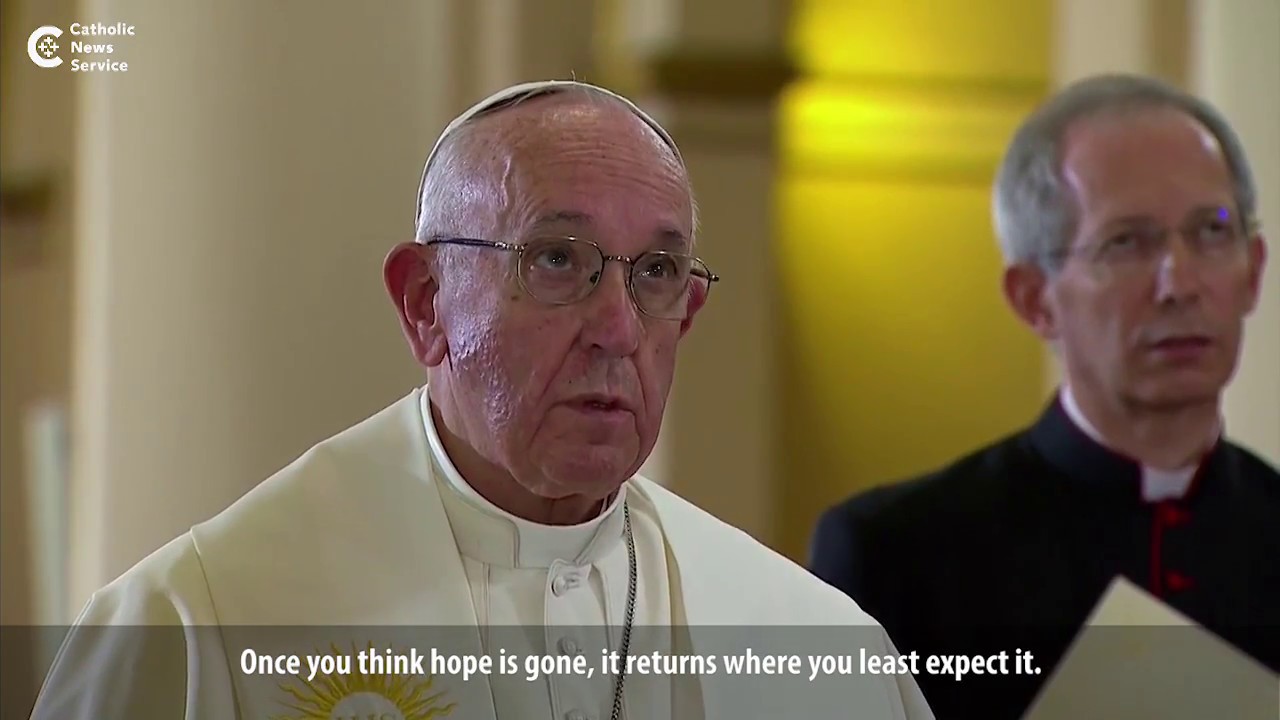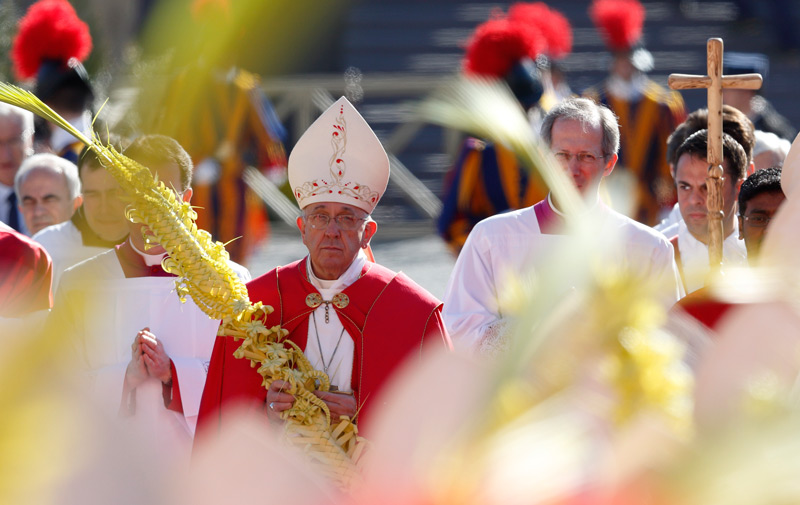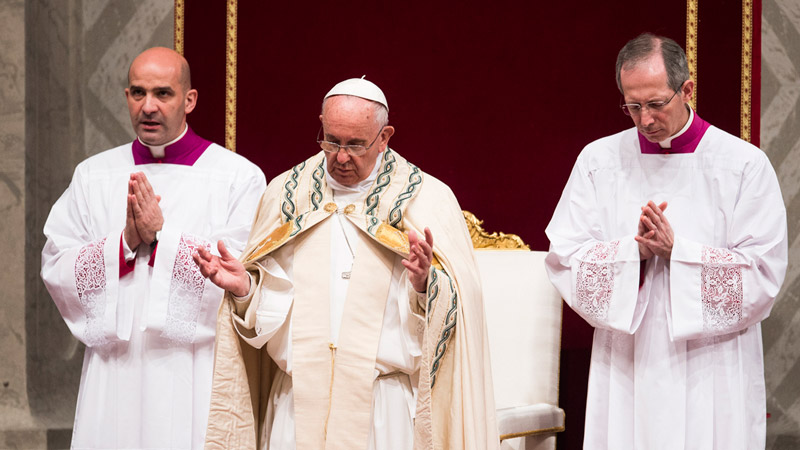
BOGOTA, Colombia—Consolidating peace in Colombia will mean overcoming “the darkness” of inequality and a lack of respect for human life, Pope Francis said.
“Here, as in other places, there is a thick darkness which threatens and destroys life,” the pope said in his homily at a late-afternoon Mass Sept. 7 in Bogota’s Simon Bolivar Park.
Colombian authorities said more than 1.1 million people gathered in the park for the Mass. Many of them were soaked in a rainstorm before the pope arrived, but as Mass began, bits of blue sky began to appear.
Still, preaching about the Gospel story of Jesus’ first encounter with Simon Peter after the fishermen had fished all night without luck, Pope Francis spoke about the turmoil and darkness of the sea as a symbol for “everything that threatens human existence and that has the power to destroy it.”
For Colombia, just starting to recover from more than 50 years of civil war, and for many other nations as well, the pope said, the threats come from “the darkness of injustice and social inequality; (and) the corrupting darkness of personal and group interests that consume in a selfish and uncontrolled way what is destined for the good of all.”

The threats include “the darkness of disrespect for human life which daily destroys the life of many innocents, whose blood cries out to heaven; the darkness of thirst for vengeance and the hatred which stains the hands of those who would right wrongs on their own authority; the darkness of those who become numb to the pain of so many victims,” he said. But “Jesus scatters and destroys all this darkness.”
In society, in politics and in the church, Pope Francis said, people can get “tangled up in endless discussions” about what went wrong and whose fault it is. But the only way forward is to follow Jesus, obeying his command to cast out the nets, which means taking responsibility for personal conversion and changing the world.
“Jesus invites us to put out into the deep, he prompts us to take shared risks, to leave behind our selfishness and to follow him,” Pope Francis told the crowd, which included Colombia’s President Juan Manuel Santos and his wife.
Jesus wants people to leave behind their fears, “which paralyze us and prevent us (from) becoming artisans of peace, promoters of life.”
The people of Colombia, he said, are called to continue their conversion to peace and respect for all the nation’s people. That can happen only by promoting unity, “working for the defense and care of human life, especially when it is most fragile and vulnerable: in a mother’s womb, in infancy, in old age, in conditions of incapacity and in situations of social marginalization.”
Jesus calls people “out of darkness and bring us to light and to life,” the pope said. “He calls everyone, so that no one is left to the mercy of the storms,” asking the strong “to carry the most fragile and promote their rights.”
After the Mass, Pope Francis was scheduled to greet bishops from neighboring countries, including from Venezuela, which is in the midst of a social, political and economic crisis.

Venezuelan Cardinals Cardinal Jorge Urosa Savino of Caracas and Baltazar Porras Cardozo of Merida told reporters Pope Francis also invited them to discuss the crisis with him.
“We have the highest inflation in the world, an inflation of 700,000-800,000 percent,” Cardinal Urosa said. It is “a truly desperate situation. There are people who eat the garbage; yes, there are people who eat garbage, and there are people who die because there is no medicine.”
He said the bishops also wanted to tell the pope more about “the serious political situation, because the government is doing everything possible to establish a state system, totalitarian and Marxist.”
Cardinal Porras added, “I think that this meeting is a real gift that the pope is giving to all of the Venezuelan people through the bishops who are here.”
Pope Francis also delivered a personal message to the youth of Colombia, turning what was originally described as the “blessing of the faithful” Sept. 7 into a rallying cry to an estimated 22,000 young Colombians gathered in Plaza Bolivar outside the cathedral and cardinal’s residence.
He told them the country’s elders need the encouragement and insistence of young people, who believe with all their hearts that forgiveness is possible and grudges don’t have to last for decades.
“Dream big,” he said. “Help us, your elders, not grow accustomed to pain and death.”

Pope Francis not only described the youth as the “hope of Colombia and of the church,” but he said that when they walk the path of empathy, understanding, encounter, forgiveness and hope, people can see in them the actions of Jesus, “the messenger of peace, the one who brings us good news.”
“Do not let anyone rob you of your joy,” the pope told the youth, who were singing, dancing and waving flags and homemade, oversized foam gloves.
“Keep joy alive,” he encouraged. “It is a sign of a young heart, of a heart that has encountered the Lord.”
Fueled by joy, he said, young people can spread hope and confidence in a new future for Colombia, one that finally and definitively turns the corner after more than 50 years of civil war, death and destruction.
“Do not be afraid of the future,” the pope said. “Dare to dream big.”
Young people almost naturally are sensitive to the suffering of others, he said. That’s why so many volunteer organizations all over the world rely on the young to carry out their work. It is possible, he added, that “death, pain and division have impacted you so deeply that they have left you half-dazed, as if numb,” but he pleaded with them to open their hearts to the suffering of others and mobilize to respond.
Living in a country at war, experiences of poverty or of broken homes, seeing peers give in to drug addiction — all those things make young people see that “not everything is black and white,” the pope said. Some people react by falling into relativism, thinking that nothing is clearly right or wrong — but “wrong is always wrong and cannot just be smoothed over,” he said.
Another reaction, a better reaction, Pope Francis said, is that of perceiving the pain of those who suffered, not only judging actions, but understanding the individuals involved and the endless number of causes, of mitigating factors.
That understanding, the pope said, must be extended to their parents and grandparents, who could not or did not know how to come to an understanding and to end the civil war sooner.
Young people are experts at not getting entangled in old stories and grudges, he said. “You help us in the desire to leave behind what has hurt us, to look to the future without the burden of hatred.”
“Precisely for this reason you are facing the enormous challenge of helping us to heal our hearts; of passing on to us the youthful hope which is always ready to give others a second chance,” Pope Francis said.
He ended with a plea and prayer for all the nation’s people: “Do not let difficulties weigh you down; may violence not break you; may evil not overwhelm you.”
By Cindy Wooden / Catholic News Service



